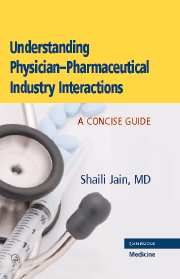Book contents
- Frontmatter
- Contents
- Acknowledgments
- Foreword
- Introduction
- 1 Gifts from the Pharmaceutical Industry to Physicians: Do They Influence your Prescribing?
- 2 Ethical Considerations of Receiving Gifts from the Pharmaceutical Industry
- 3 One on One: An Analysis of the Physician–Pharmaceutical Company Representative (PCR) Detailing Interaction
- 4 Medical Academia and the Pharmaceutical Industry
- 5 Teaching Physicians in Training about Pharmaceutical Industry Promotion
- 6 Continuing Medical Education: How to Separate Continuing Medical Education from Pharmaceutical Industry Promotion
- 7 Professional Policies on Physician–Pharmaceutical Industry Interaction (PPII)
- 8 Preserving Professionalism: Patients' Perceptions of Physicians' Acceptance of Gifts from the Pharmaceutical Industry
- 9 To Sample or Not to Sample? The Use of Pharmaceutical Industry–Supplied Medications in Medical Practice
- 10 Physician–Pharmaceutical Industry Interactions (PPIIs), the Law and the Media
- 11 Direct-to-Consumer Advertising (DTCA)
- 12 Pharmaceutical Industry Interactions with Health Care Professionals: A Global Perspective
- 13 Internet Resources for Teaching about PPII and Independent Sources of Information about Prescription Medicines
- Appendix I
- Appendix II
- Index
- References
7 - Professional Policies on Physician–Pharmaceutical Industry Interaction (PPII)
Published online by Cambridge University Press: 03 March 2010
- Frontmatter
- Contents
- Acknowledgments
- Foreword
- Introduction
- 1 Gifts from the Pharmaceutical Industry to Physicians: Do They Influence your Prescribing?
- 2 Ethical Considerations of Receiving Gifts from the Pharmaceutical Industry
- 3 One on One: An Analysis of the Physician–Pharmaceutical Company Representative (PCR) Detailing Interaction
- 4 Medical Academia and the Pharmaceutical Industry
- 5 Teaching Physicians in Training about Pharmaceutical Industry Promotion
- 6 Continuing Medical Education: How to Separate Continuing Medical Education from Pharmaceutical Industry Promotion
- 7 Professional Policies on Physician–Pharmaceutical Industry Interaction (PPII)
- 8 Preserving Professionalism: Patients' Perceptions of Physicians' Acceptance of Gifts from the Pharmaceutical Industry
- 9 To Sample or Not to Sample? The Use of Pharmaceutical Industry–Supplied Medications in Medical Practice
- 10 Physician–Pharmaceutical Industry Interactions (PPIIs), the Law and the Media
- 11 Direct-to-Consumer Advertising (DTCA)
- 12 Pharmaceutical Industry Interactions with Health Care Professionals: A Global Perspective
- 13 Internet Resources for Teaching about PPII and Independent Sources of Information about Prescription Medicines
- Appendix I
- Appendix II
- Index
- References
Summary
In recent decades many professional organizations have produced ethical guidelines or position statements on PPII. These documents cover many areas of interactions, from accepting gifts or continuing medical education (CME) support to conducting ethical research collaborations.
The American Medical Association (AMA) responded to public concerns regarding PPII in the 1980's with a code of medical ethics recommending that gifts to physicians should benefit patients, relate to the physician's work and be of minimal value.
Concern about increases in pharmaceutical industry (PI) promotion in training settings led to a 2002 position paper from the Accreditation Committee for Graduate Medical Education (ACGME) that emphasized the need to separate medical education from PI promotion.
The Accreditation Council for Continuing Medical Education (ACCME) has six standards for commercial support of CME activities.
The Association of American Medical Colleges has issued a publication in 2 parts titled Protecting Subjects, Preserving Trust and Promoting Progress.
The evidence of PI influence on medicine and the ensuing concern for professional integrity and patient care resulted in the American College of Physicians – American Society of Internal Medicine producing two ethical position papers. Both papers cover PI gifts to physicians; PI influence on medical education; academic and industry collaboration; and influence on medical professional societies.
In 1994 the Canadian Medical Association published a position paper, “Physicians and the Pharmaceutical Industry.” Guidelines were developed by the CMA to assist physicians in determining when a relationship with industry is appropriate.
- Type
- Chapter
- Information
- Understanding Physician-Pharmaceutical Industry InteractionsA Concise Guide, pp. 36 - 39Publisher: Cambridge University PressPrint publication year: 2007



